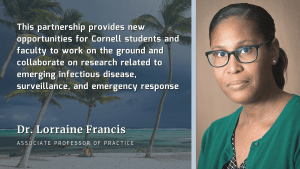Caribbean Agency Collaboration
 When Dr. Lorraine Francis, associate professor of practice with the MPH Program, arrived in Ithaca in 2019, she brought to the Cornell community 18 years of experience in Caribbean public health, including tracking disease outbreaks and helping Caribbean nations prepare for and respond to public health emergencies.
When Dr. Lorraine Francis, associate professor of practice with the MPH Program, arrived in Ithaca in 2019, she brought to the Cornell community 18 years of experience in Caribbean public health, including tracking disease outbreaks and helping Caribbean nations prepare for and respond to public health emergencies.
Last spring, Francis helped solidify Cornell’s link to Caribbean public health by establishing a Memorandum of Agreement between the university and the Caribbean Public Health Agency (CARPHA). “This agreement fosters a significant relationship between CARPHA and Cornell for cooperation in research and academics,” says Francis. “It will provide opportunities for Cornell students and faculty members to work on the ground and collaborate on research related to emerging infectious disease, surveillance, and emergency response.”
“The interactions between CARPHA and Cornell will broaden our horizons and give us new perspectives,” says Dr. Joy St. John, executive director of CARPHA. “We want to expand opportunities for our staff to understand different cultures and organizational set-ups. We want to share that Caribbean spicy goodness that you cannot get anywhere else with the Cornell family, and we hope to share in the distinctive culture that Cornell has to offer.”
A key aspect of the partnership will be building capacity in both the Caribbean and at Cornell, explains Dr. Alexander Travis, director of Cornell’s MPH Program. “This relationship is a two-way street where we learn from each other,” he says. “We teach not just in the classroom, but also through hands-on, practical experiences about how you do public health in the world. CARPHA offers us access to a much larger network of world class experts and allows us both to broaden our impacts globally.”
CARPHA is a unique entity. Established in 2011, CARPHA became operational in 2013 when five separate regional health institutions merged; it is the lead public health agency for 26 member states in the Caribbean, and one of only three multinational public health organizations in the world. “We understand that disease does not recognize borders,” says Cherril Sobers, resource mobilization and partnership specialist at CARPHA. “Our member states are closely connected geographically, and we have always practiced what we consider intense collaboration.”
“Small island developing states, like many in the Caribbean, are especially vulnerable to climate change,” says Francis. “These countries are experiencing more extreme weather events and, because they are small, weather events tend to affect them more devastatingly.” Changing environmental factors such as rising temperatures and increasing humidity also lead to a scarcity of freshwater in many Caribbean nations, while favoring the survival of disease vectors like mosquitoes, resulting in higher rates of vector-borne diseases. A key area of collaboration between Cornell and CARPHA will likely involve implementing integrated disease surveillance in a wide range of member states and laboratories, to improve data in action, and evidence-based public health decision-making and policy development.
“We anticipate utilizing the enormous enthusiasm across campus surrounding public health,” says Travis. Because the MPH Program stretches across Cornell’s campuses, that could mean pulling in faculty and students from Weill Cornell Medicine, the Department of Entomology’s Center for Vector-Borne Diseases, and more.
Adapted from an article by Sheri Hall, originally published in the Cornell College of Veterinary Medicine News, 6/29/22; updated 7/5/22
